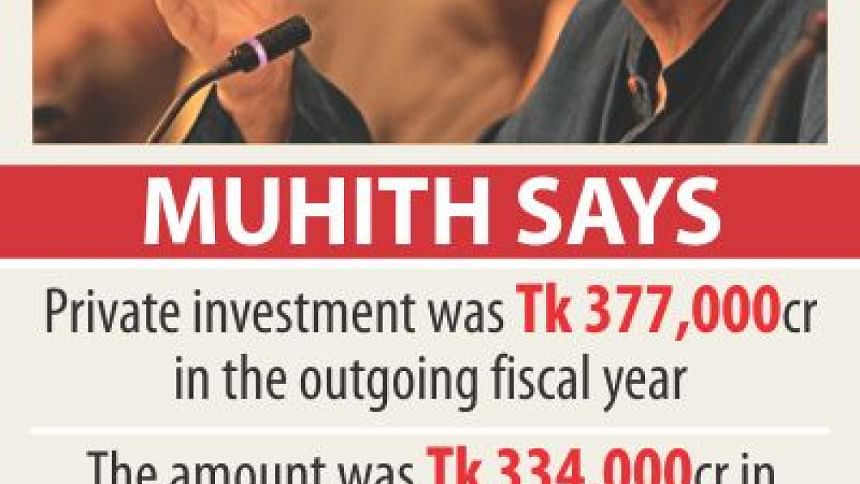Private investment to rise 22pc next year: Muhith

Private sector investment will increase 21.75 percent year-on-year to Tk 459,000 crore next fiscal year owing to political stability and full implementation of the new pay scale for government staff, said Finance Minister AMA Muhith.
In the outgoing fiscal year, private sector investment was about Tk 377,000 crore, up from previous year's Tk 334,000 crore, he said in his closing speech in parliament on the proposed budget for fiscal 2016-17 yesterday.
He also ruled out any doubts about not being able to achieve next fiscal year's gross domestic product growth target of 7.2 percent.
The trend of positive change that is visible in various indicators related to private sector investment indicates that the growth target will be achieved in the next fiscal year, Muhith said.
The increase in public investment in infrastructure and the rise in consumption due to full implementation of the new pay scale will push up investment.
Also, the rise in the number of expatriates will increase remittance, while low inflation will hike real wage, which will increase both consumption and investment, according to the finance minister.
The existing political stability will also help increase the confidence of investors.
“I think we have by and large shown conservative attitude in this regard that the rate of annual growth has not been kept at 0.5 percent,” he said while pointing at those who express doubt about the achievability of the growth target.
This fiscal year, private investment as a ratio of GDP fell from 22.07 percent to 21.78 percent.
“Though private investment compared to GDP plummeted, the rate of growth is on the rise, which mainly indicates the rise in efficiency of investment,” he said.
The GDP growth this fiscal year has been estimated to be 7.05 percent by the Bangladesh Bureau of Statistics, up from previous fiscal year's 6.55 percent.
However, Muhith acknowledged that there are a number of impediments to increasing private sector investment. These are: a lack of adequate energy, scarcity of land and poor communication infrastructure. The government is wholly conscious of the limitations and have taken up a good number of measures to address them, he said.
For instance, the government has taken an initiative to quickly implement eight mega projects to remove the weakness in communication infrastructure. Two more projects -- the Padma rail link project and Dohazari-Cox's Bazar-Gundam project -- will be included in these.
Some more projects -- Matarbari coal port, Bhola gas pipeline, and setting up a petrochemical factory in the coastal area -- will be treated as mega projects.
To implement the mega projects, the government will take some non-concessional loans, Muhith said, adding that it will be ensured that the country's debt sustainability is not breached.
In the last 45 years, Bangladesh succeeded in keeping its debt burden in foreign loans limited to within 24 percent of its national income, he added.
Some Tk 34,230 crore has been allocated for next fiscal year to improve communication infrastructure.
Presenting the initiatives to ease traffic jam in Dhaka, he said the Metropolitan Transport Authority covering the city corporations in Dhaka and the adjacent areas will start their work next year.
In industrial management in Bangladesh there is an acute shortage of mid and high level officials, due to which about $4 billion fly abroad in legal ways every year, Muhith said. “From this, an idea can be reached about the number of foreigners working in Bangladesh.”

 For all latest news, follow The Daily Star's Google News channel.
For all latest news, follow The Daily Star's Google News channel. 



Comments